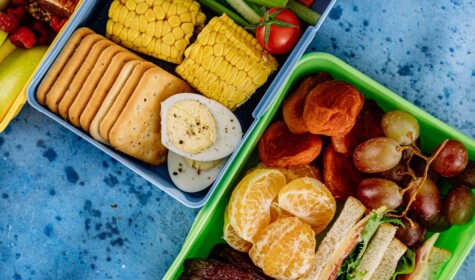Amid the cost-of-living crisis, families across the UK are struggling to afford daily essentials, like housing, heating and food. Last year, 2.5 million people were forced to make use of food banks, an increase of almost 600,000 people on the previous year. For many families, the severity of the current situation means cutting back and often skipping meals altogether. According to a recent study, more than half of those experiencing food insecurity are not only buying less food, but cutting out healthier produce they deemed unaffordable, including fruits and vegetables. For children, in particular, this reality can have serious implications for health and well-being, with hunger also impacting upon educational attainment and productivity.
International research has revealed the numerous benefits that free school meals can provide, with lasting improvements to individuals and society in the short, medium and long term. Recently, Impact on Urban Health commissioned an ambitious analysis of the societal and economic benefits of increasing free school meal provision in England. They found that for every £1 invested, £1.38 would be returned through social, health and educational benefits, with further indirect economic advantages, such as growing the school food economy through the expansion of school catering employment opportunities.
Feeding the Future
Now, celebrity chefs Jamie Oliver, Tom Kerridge and Hugh Fearnley-Whittingstall are backing a new campaign to increase the number of children eligible for free school meals. At present, children of parents who are on Universal Credit and have an annual income of no more than £7,400, or are on other benefits such as jobseeker’s allowance, are eligible. However, a further 800,000 children from families on Universal Credit miss out on free school meals because of their household income. This is causing growing concern for schools, many of which have taken it upon themselves to feed the children who don’t quite qualify for free meals.
It’s not just celebrities recognising the urgent need for change. In September, the Labour Party promised to provide every primary school child in England access to free breakfasts under their plans to modernise the childcare system and support lower-income families. Wales and Scotland have already announced plans to provide universal free lunches to all primary school children, whilst Northern Ireland has almost doubled the eligibility income threshold to £14,000.
Edible school gardens and local procurement
At Damers First School in Dorset, school lunches are supplied by Local Food Links, a Dorset-based social enterprise that aims to source fresh ingredients and support local businesses. Growing food is also an important part of school life. The school’s kitchen garden has ten raised beds and an allotment, growing a diversity of vegetables and herbs, many of which are used during Food Technology classes. There’s also an orchard area with native apple and pear trees, as well as a sensory garden and wildflower meadow. In the garden, children learn how to sow seeds, care for the plants, harvest the produce and even compost any waste! The space also allows opportunities for the children to spend time in nature, whilst learning to identify the variety of birds and insects that visit the grounds.
Gardens like this appear to be popping up in schools across the UK and internationally. ‘Edible education’ is an idea coined by Alice Waters – chef, author, food activist and founder of Chez Panisse restaurant in Berkeley, California. Waters founded the Edible Schoolyard Project in 1995 and has since been on a mission to transform the education system by using organic school gardens, kitchens and cafeterias to teach both academic subjects as well as the value of nourishment, stewardship and community. Today, the project works with nearly six thousand schools and continues to build relationships between schools, farmers and food growers.
Connecting schools to food producers is something that the Sustainable Food Trust believes passionately in too. In Wales, together with The Harmony Project and the University of Wales Trinity Saint Davids, a new collaboration seeks to incentivise local procurement in primary schools. “If schools were encouraged to buy directly from local, regenerative farmers and growers, they would not only be supporting UK food production (something that Jamie Oliver has also shown his support for), but in doing so, they would be offering children the high-quality, nutritious food they both need and deserve,” says Patrick Holden, Chief Executive of the Sustainable Food Trust.
On the nutrient point, many of the fruits, vegetables and grains sold in supermarkets today have been shown to be far less nutritious than they were seventy years ago. “To improve the health of our young people in the long term, school leaders should use their purchasing power to support farmers and growers to build soil health and produce nutrient-dense foods,” says Holden.
Nourishing food for people and planet
Serving local, agroecologically produced food does not have to break the bank. In fact, as Richard Dunne, Director of The Harmony Project, demonstrated during his time as Headteacher of a state primary school, serving seasonal, local produce can be extremely cost-effective. The lunches served at his school were 90% organic and within the school’s catering budget. Achieving this meant thinking creatively about the menu, including serving starters instead of desserts, limiting waste and pairing back the menu to include less meat, but of higher quality. “Key to this” says Dunne, “is that senior leaders in schools recognise the power they have as customers to influence what is delivered on children’s plates. There will be challenges, particularly when schools are in more urban areas, but with some creative thinking and a determination to make it happen, anything is possible.”
Such examples show the potential for improving the quality and availability of food served in schools, not to mention increasing opportunities for learning about seasonality, taste and nutrition. We have the chance now to improve not only the provision of food in schools at a time of great need, but to simultaneously support UK farmers and growers to produce foods that benefit climate, nature and human health.
To support the campaign to increase the number of children eligible for Free School Meals, visit the Feed the Future website. Feed the Future is being driven by The Food Foundation, School Food Matters, Sustain, Bite Back 2030, Child Poverty Action Group, Impact on Urban Health, Jamie Oliver Ltd and Chefs in Schools, representing more than 500,000 teachers.



